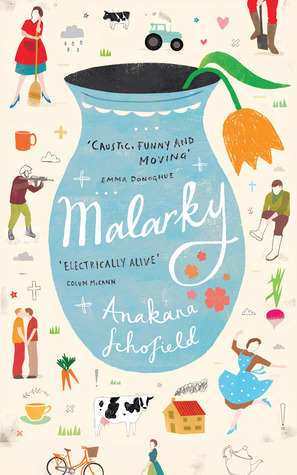 Rea Tarvydas
Rea Tarvydas
a review of
Malarky
by Anakana Schofield
Biblioasis (2012)
ISBN 978-1-926845-38-8
$19.95
Some novels are laid out on a grid: turn left at the careful transition to arrive at the next chapter. Others are a tangle of intersecting roads and side streets, and there’s a car wreck on the fast road that’s creating havoc with traffic patterns. Malarky is the latter. Don’t expect detailed directions and a simple trajectory. This is one wild ride. Annabel Lyon said, “Malarky spins and glitters like a coin flipped in the air — now searingly tragic, now blackly funny. Brilliant, brilliant, brilliant.” I agree wholeheartedly.
Set in present day west of Ireland, Anakana Schofield tells the story of Our Woman, a farmer’s wife, as she struggles to understand both her adulterous husband and her college-age son, Jimmy — and, caught in her thoughts, discovers her own life is unfulfilled. She is obsessed with sex as an antidote to her joylessness and, as she methodically explores her sexuality, comes to understand both her husband’s infidelities and her son’s sexual life as a gay man. Delightfully, she sides with her son “at the same malarky” (21) and explores this through a series of hilarious sexual encounters.
I loved this book from its opening lines. “— There’s no way round it, I’m finding it very hard to be a widow, I told Grief, the counsellor woman, that Tuesday morning” (7). What captured me was the strong, real voice of a woman who “wasn’t in my ordinary life, I was in an extraordinary moment in my ordinary life” (129). A woman-on-the-verge, you might say.
Although the reader soon discovers that both husband and son are deceased, this novel is delightful and funny. I was struck by how engaging the character of Our Woman is as she alternates between compulsively caring for a snoring drunk on the bus by wiping his face clean with wet wipes, thinking, “She could bring him home and fix him up” (145), and rebelling against her husband, “I remaining furious, paid little heed. I’d paid so much heed, now I was on strike” (48). I was also struck by the strength and value of her friendships. Our Woman’s girlfriends appear at her kitchen door on a daily basis for a spot of hot tea, provide meddling advice, and the tape measure. Jimmy’s friends are also there for him. When Our Woman escapes to Dublin to get away from marital discord and visits son Jimmy, she sits with them in a gay bar with her knitting in her lap, enjoying their company. “They were young, they were young lads, all of them…[b]ut they were pleasant, laughed together” (42).
Malarky is an episodic novel and, as such, shifts back and forth through time. Each episode involves tense and point of view shifts, and challenges the reader to follow along. This is not an easy book to read and the reader must have faith. Schofield’s structural choice is perfect for an exploration of loss, and mimics the movement, back and forth, through the messy process. It’s real life.
Schofield’s strong beautiful prose is compelling, propelling you through this turbulent story:
In the Blue House today she sits on the low Chinese fabric stool amid the rubble and jumble of the life that departed here so inexplicably that day. Those waves from Jimmy’s hand are still with her from the bus and new ones arrive as she sits in the house she is not supposed to be in (148).
Of interest, Schofield’s prose falls apart as Our Woman falls apart, another stylistic choice that mimics Our Woman’s mental dissolution in the psych ward of Castlebar Hospital. Throughout, her girlfriends are by her side, warning her, bickering and berating one another while Our Woman acts out yet again. Here’s an example:
Joanie thinks Bina’s greedy eating all Our Woman’s Quality Street. As Bina is blaming Joanie, and Joanie is blaming Bina, Our Woman inquires where does Bina think the woman on the front of the puzzle book lives.
— For the love of God, Bina hushes her, don’t ask me such a thing, or they’ll have the sheets off ya (210).
A gang of middle-aged women looking out for one another reminds us of what’s important in lives — our friendships.
Malarky reminded me of a rowdy Greyhound bus ride I took in the 90s. A curtain of winter rain triggered avalanches at either end of a mountain town, effectively closing down the highway, and the bus driver deserted us: stoners in the back; a couple of old ladies with asthma in the front; and, me and my seatmate. In the crowded all-night diner, the conversation deteriorated into an admission of a diagnosis of ovarian cancer from my seatmate and a flailing fistfight between the stoners. A love-struck taxi driver deposited me at the train station where a drunken MP and his sober wife argued, loudly, careening from one wooden bench to the next. The train was hours late. I wasn’t sure if I’d make it home but I did. I’ll never forget it.
I can’t wait to read Anakana Schofield’s next offering.
Anakana Schofield’s Malarkey won this year’s Amazon.ca First Novel Award. Congratulations Anakana.
This review appears in FreeFall Volume XXIII Number 2 Spring / Summer 2013

